A personal brand is a lifelong project that evolves and changes continuously. Some people think that a personal brand is the Holy Grail. Creating a powerful brand proves to be very resourceful when it comes to online marketing.
For social media managers, digital marketers, and brand strategists, cultivating a personal brand can be the key to standing out in a crowded digital world. Let’s dive into these seven actionable tips that will help you tell your story and enhance your online presence.
2. Why Is Personal Branding Important?
3. How to Improve Your Personal Brand
4.1 Be visible and easy to reach
4.2 Make yourself approachable through networking
4.3 Set up your value proposition
4.4 Show the real you online
4.5 Maintain a database of contacts and create friends in the industry
4.6 Keep up with the trends and always learn & evolve
4.7 Make the audience a part of your journey
We’ve seen it in the movies and maybe even in real life: having an important name or being an influential person in a specific niche can bring you countless benefits—gratuities, opportunities, invitations to exclusive events, and lots of other perks.
But personal branding isn’t reserved just for influencers. Everyone can build their personal brand. Whether you’re a business owner, brand manager, content marketer, community manager, social media specialist, or someone who wants to have a visible CV or create a content strategy, you can—and should—build a personal brand.
Personal branding is connected with influencer marketing and allows individuals to differentiate yourself and stand out in a competitive market. Let’s get started by diving deeper into this topic.
What Is Personal Branding?
Personal branding is not about fame or amassing a fake audience, but rather, it’s about something that makes you unique—what sets you apart from others.
Personal branding is a way to make you stand out comparing to others.
At its core, personal branding is a strategy to make you stand out. It can be defined by the value of recognition. Most people with a strong personal branding strategy are easily identifiable by others because of their experiences, the way they promote themselves, or the impact they’ve had in their industry.
If you Google your name, what comes up in the search results?
If the answer is "nothing", most probably you have to invest some time and effort into building your personal brand, because your name hasn't left an online footprint.
Many people struggle to find what differentiates them from the crowd and don’t know the steps to build their brand. Developing a personal brand, however, can significantly boost your career or business. Online, people are more likely to trust an individual over a corporate brand.
To begin, you need a personal branding kit, a marketing plan, or even a personal brand strategy. Before you jump in, though, you’ll need two essential things:
- Skills: People should remember you for something you’re good at.
- Communication: Be self-aware of how you communicate with your targeted audience and how your personality shines through in those interactions.
Why Is Personal Branding Important?
Personal branding is important because it's connected to the process of building an online reputation. When people start recognizing you, you can make a stronger impact and build meaningful relationships that will advance your career.
A personal brand carries authority. People will recognize your expertise because it’s attached to your name and personality—both professional and personal.
In the past, your experience talked through your name. When you have a strong personal brand it speaks for itself.
But with a solid personal brand, your name speaks for itself. However, you must attract positive experiences and avoid getting involved in negative or shady activities that could tarnish your reputation.
When deciding to build your personal brand, define the area of expertise you want to be recognized for—something that accurately reflects your skills and personality. For inspiration, check out personal brand examples and success stories of individuals who have built strong personal brands. They’re great case studies to learn from.
Personal Brand Examples
When you hear the name Mark Zuckerberg, what comes to mind? Is it Facebook, privacy issues, or maybe something else? The fact that you thought of something related to Mark proves how strong his personal branding is.

To put the question into a more hilarious perspective: When you hear about "The Bing Bang Theory" TV series what do you think? Is it science, is it Penny or Sheldon Cooper or something else? If you thought of any characters, then personal branding is the reason. Even on movies or TV series, being able to create personal branding for such a strong fictional character by the fans and the production is remarkable.

Another excellent example of successful personal branding is Jay Baer, founder of Convince & Convert. He’s known for his books, public speaking, and his unique, colorful suits, all part of his visual branding. When invited to events, the organizing team even gets to pick which suit he’ll wear. This playful approach is just one of many strategies for success.
The interesting thing about his strategy is the option to contribute and be a part of his story. When he's invited to an event, the organizing team gets the opportunity to choose the suit he'll be wearing.
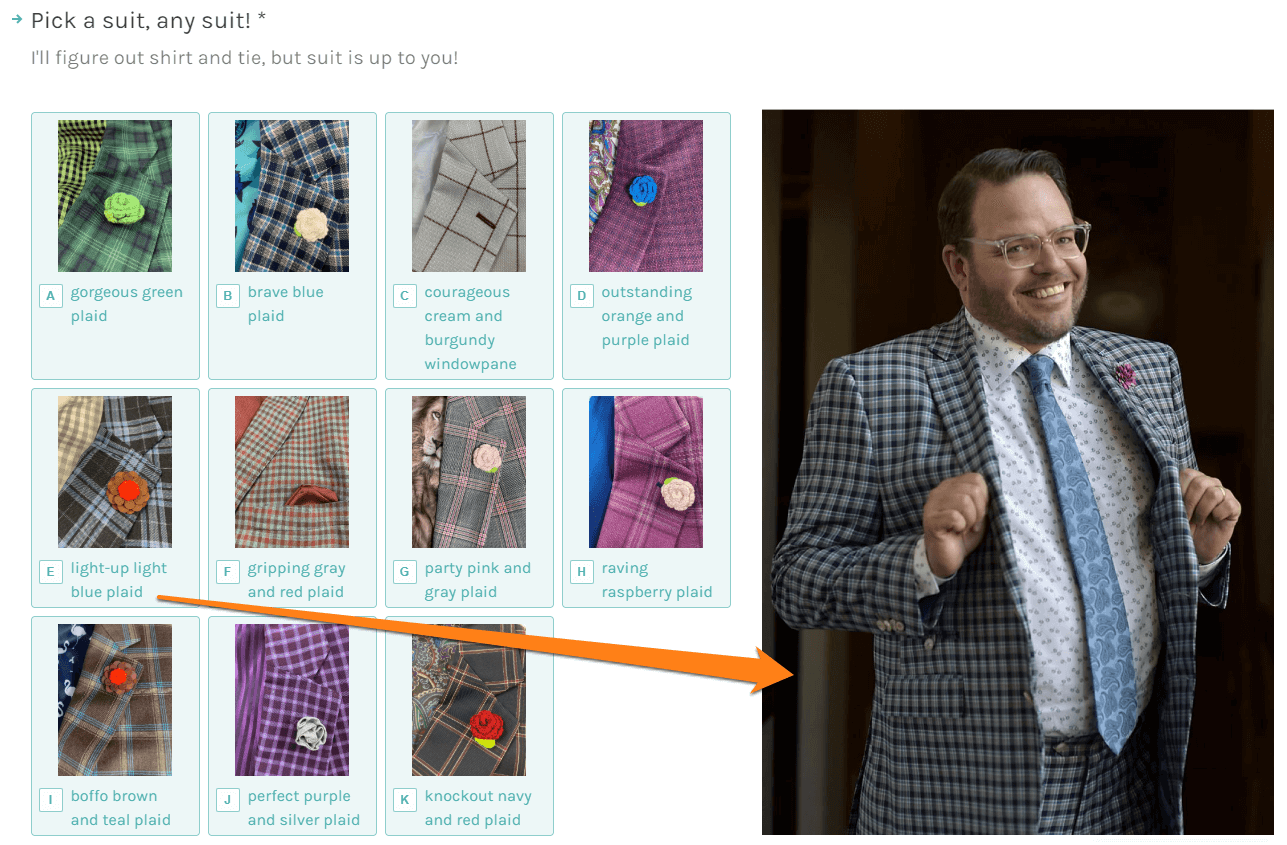
How to Improve Your Personal Brand
To be able to improve your personal branding you'll need to embrace networking and have an affinity for always meeting new people and sharing ideas.
Networking is an essential part of career advice because it can open doors to numerous opportunities. Studies show that 85% of jobs are filled through networking.
Studies show that 85 percent of all jobs are filled through networking. Participating in event networking will also boost your career growth.
Collaborating with other publications, writing guest posts, and participating in podcasts or interviews are just a few ways to improve your brand’s visibility. Each interaction builds credibility and expands your audience.
Improving your personal brand comes along with the attention you give to your audience, beside the information you feed them with.
You should also quantify your accomplishments. Highlight the number of business collaborations, books written, deals closed, or any relevant metrics that demonstrate your expertise. Clear data will help differentiate yourself from the competition and build trust.
Another good option is to quantify your accomplishments by the number of people helped, business collaborations, written books, closed deals, or any other way to give accurate numbers of what you did.
Additionally, follow corporate brands and personal brands within your niche to identify strategies for success. These examples can serve as a guide for improving your own branding approach.
Top Personal Branding Tips
Not everything you find only is helpful and has actionable information. We've tested and followed best practices to offer you trustworthy and actionable personal branding tips.
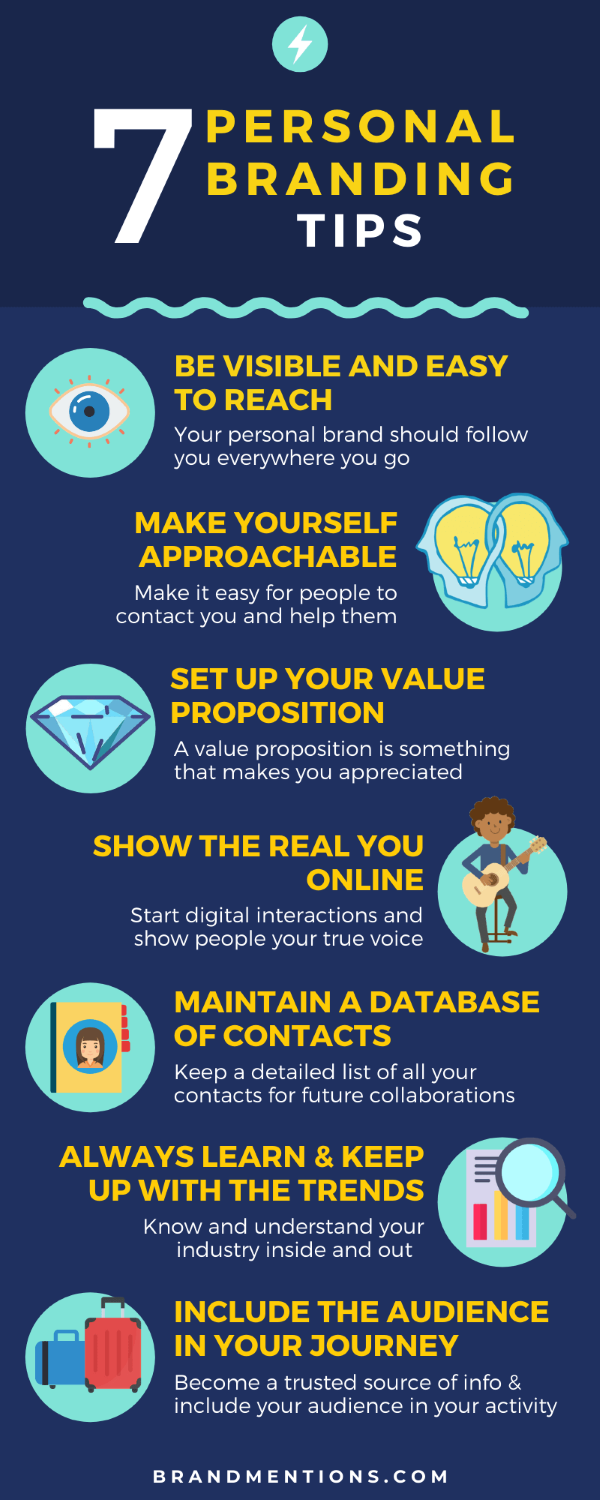
1. Be Visible and Easy to Reach
One of the most obvious and indispensable tips for building your brand is to be visible and reachable.
Your personal brand should follow you everywhere you go.
First and foremost, branding yourself means being easy to find. You want to be where your targeted audience is. Whether you’re active on a social media platform or writing a blog post, having a visible, approachable presence is essential.
Start by optimizing your public social media profiles - like LinkedIn profile - and setting up a personal website that accurately reflects your expertise and personality. Be consistent with your social media marketing and ensure you're easily contactable. This could mean simplifying your posting schedule, or perhaps setting up a regular time to interact with your audience. Be present there and post on social media constantly. Make it possible for your followers to contact you and interact with them. Ask questions to them and make them a part of your brand.
The more visible you are, the stronger your personal brand will be.
For professionals working on their personal branding strategy, it’s vital to showcase your core values and telling your story in a way that demonstrates your unique skills and builds trust. Consistency across platforms is key—ensure that your online presence is cohesive and supports your brand strategy.
2. Make yourself approachable through networking
Networking is the cornerstone of building your personal brand. Connecting with peers and influencers can significantly boost your credibility. Whether you’re engaging on Twitter, LinkedIn, or attending webinars, the goal is to make real, meaningful connections.
Lots of people misunderstand the purpose of personal branding. They focus on themselves, forgetting about their audience and people's needs. Instead, you should have a desire to help people, as Sujan Patel recommends.
| Be helpful. Look for opportunities to mentor those who are facing similar challenges that you have, and give advice freely in whatever way you can to help people. | |
| Sujan Patel | |
| Co-founder Rightinbox.com / @sujanpatel | |
To stand out, offer help whenever possible. Don’t just promote yourself—promote others, share related articles, and contribute to discussions. This will not only improve your visibility but also demonstrate your expertise. Creating a network of trusted colleagues builds your credibility and shows that you’re not just here for the attention, but to advance your career and support others.
It’s essential to have a personal brand statement that clearly outlines who you are, what you do, and how you can help others.
Strong personal branding will set you apart from the competition and leave a lasting impression on potential collaborators.
Don't ignore your audience, their needs and focus on beneficial networking for both parties. Give personal examples and take every conversation as an opportunity. You'll never guess what you can learn or find out and give you great ideas.
3. Set up your value proposition
Your value proposition is what demonstrates your unique position in the marketplace. It answers the critical question: Why should someone work with you? This should be the central theme of your effective personal brand strategy. When your message is clear, it’s easier for your targeted audience and potential employers to understand what you bring to the table.
What makes you special? Why should somebody work with you? What makes you attractive from a business point of view?
Consider what sets you apart from others in your industry. Maybe it’s a unique approach to solving problems, or perhaps it’s a specific skill set that others in your niche don’t have. Regardless, your value proposition should be front and center in your personal branding efforts.
Be sure to include examples from success branding or brand examples that showcase your achievements. Whether you're helping to grow a company’s following on a social media platform or driving a content strategy that increases engagement, tangible results will speak volumes. These success stories will build credibility and help you stand out.
When creating a personal brand, it is like you're building a business and you need to take care of it.
Think about what makes you unique and set up some differentiators. There are lots of business ideas to make yourself stand out and attract attention. Position yourself with a powerful and unique value proposition, rooted in your core values. Use adjectives that highlight your expertise, but remember: honesty is the best weapon for branding yourself effectively.
For example, you can create a brand mantra, that one thing that demonstrates your unique persona and only you. This is where visual branding comes into play. Think of recognizable features: like John Lennon's round glasses versus Elton John's flamboyant frames. These are just a few examples of effective personal branding.

Besides appearance, create a short line that can describe you very well - your personal brand statement. Add strong descriptors, such as certificates, awards, national kayak canoe champion, bestselling author or anything related to you so that people could spot you from the crowd. Start telling your story.
When you’ve developed your personal brand, maintaining consistency and authenticity is key. Take a page from the career advice of established professionals: your personality and professional presence should shine through in every blog post or social media update. By being intentional with how you present yourself, you’ll ensure your personal brand is something that potential employers and business owners will remember.
You should add that description to all About me sections from your social networks: Twitter, Facebook, Instagram, Medium, and so on with few changes. Using social media for personal brand purposes will help you create connections with your audience and it can take your career to the next level.
4. Show the Real You Online
Authenticity is one of the most valuable aspects of building trust in the digital world. People want to connect with real humans, not just polished brands. Share aspects of your personal life, values, and experiences that align with your professional goals.
This doesn’t mean you need to reveal every detail of your life, but sharing what inspires you, showcasing your hobbies, or even offering a behind-the-scenes look at your work process can humanize your brand. Authenticity in personal branding means being open, approachable, and honest about who you are.
Follow the 80-20 social media marketing strategy: 80% information and only 20% commercial.
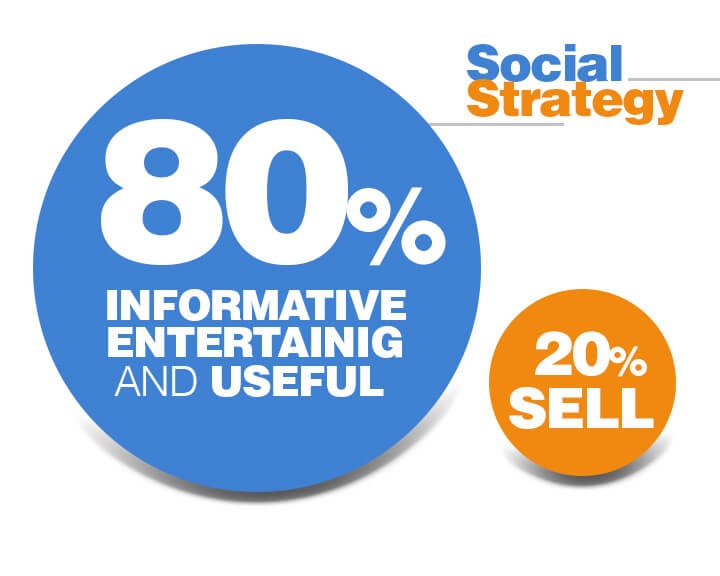
Integrate yourself into conversations, do podcast hosting, start digital interactions and show people your expert opinions, your true self, your true voice. Present yourself as an expert. Consumers love the person, the human touch behind every brand or official face there is online.
| The biggest mistake people make when thinking about personal branding is overvaluing their follower count and undervaluing the number of people they’ve helped. That’s where true influence and personal branding comes into play. The more you help people achieve their goals, the stronger your personal brand will be. Your personal brand is your reputation. And your reputation is built on how you interact with people, the value you give to your community or industry consistently and the way you lead. | |
| Ross Simmonds | |
| Founder, CEO of Foundationinc.co / @TheCoolestCool | |
It will make you have a friendlier face and be a human, which you are, strangely. Your online presence will have a lot to gain from this honest strategy. You'll be an authentic person.
For example, use personal brand statement examples that emphasize both your professional expertise and your personality. Show that you are relatable while also maintaining your professional integrity. This balance is crucial in visual branding—how your images, logos, and content reflect both your skills and who you are as a person.
Show them what you do on the weekends, where you eat, what your hobbies are and so on. People love to see what's behind the screen and face the real person.
Your personal brand strategy should rely on the human perspective, on your personality. Yes, you are a brand, but don't forget about the other half - "personal" (personal brand). As you can see, personal comes before brand. Think of who you are as a person and decide what you show to the world.
Communicate directly with your audience.
Once you understand that, you'll be able to create a community. A powerful personal brand means a strong community.
Video-audio content, such as vlogging or podcasts, will help you promote your brand and build a larger community by attracting people who are following such content. You can leverage video for growing a powerful personal brand.
To succeed, you need to start posting consistently. Establish a regular posting schedule across your social media platforms or personal website to keep your audience engaged. A consistent approach builds trust and builds credibility over time.
5. Maintain a Database of Contacts and Create Friends in the Industry
Think long term.
Growing your personal brand means growing your list of contacts.
Every interaction in the digital space is an opportunity to build long-term relationships. A key step to building your personal brand is maintaining a solid network. Keep a list of contacts who can help you grow or introduce you to new opportunities. This could be industry leaders, fellow social media tool users, or even collaborators who share similar goals.
Consider using tools like a CRM to track interactions, or simply create a detailed spreadsheet to keep track of your network. As you continue to grow, this contact list will become invaluable for your business ideas and future collaborations.
Having an updated database with all the information will be easier for you to contact people, to send them newsletters and relevant information. You can use that list to import it in any free email marketing tool and start promoting your digital marketing campaigns as you wish.
Getting a list of contacts is a more difficult job if you don't have the right tools and strategy. You can extract a list of contacts from BrandMentions, for example. The tool can help you monitor your brand and everyone that talks about it, no matter if it's a website, a public figure, a client or another brand.
You can see a list of Top Influencers and Top websites that mentioned your brand, plus you get some extra metrics regarding reach, impressions and a full list of URLs where they mentioned you.
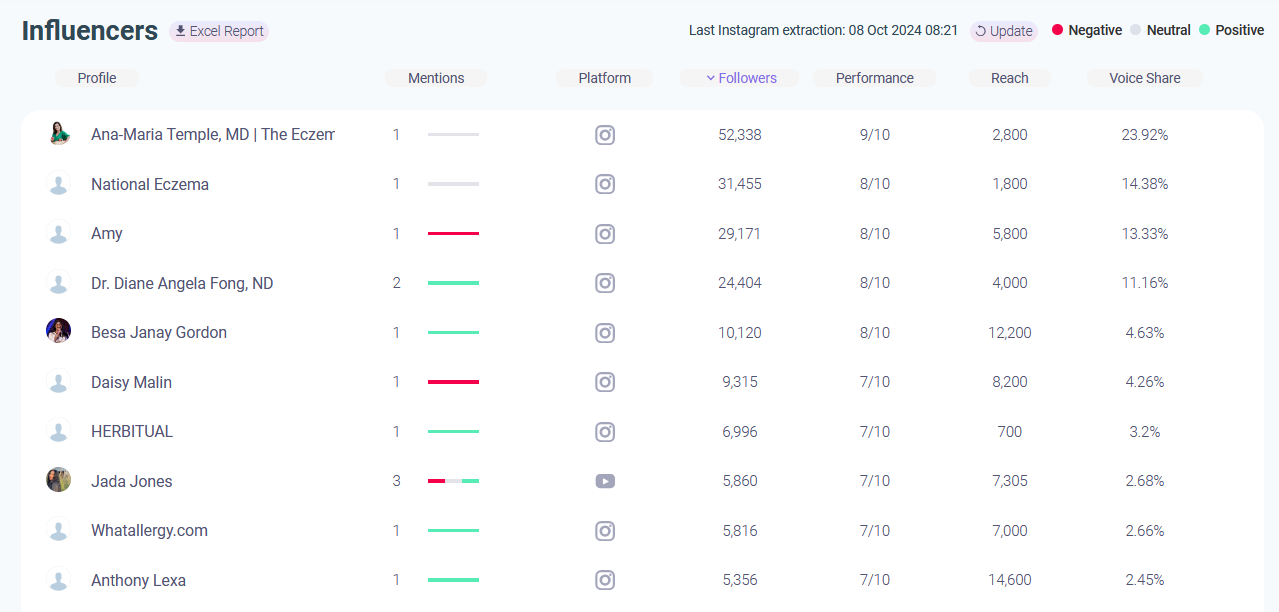
After that, you can add their information in your excel file to send them valuable info on email and tag them on social media for boosting your social posts.
If you have a list or you want to build one from scratch, don't forget to update it from time to time. Once you commit to something, keep your word.
An updated list of contacts can open lots of opportunities. You can collaborate with popular content writers from big publications so you can contribute and try guest posting. And the list of ideas can go on. Listen to why you should do that from Lilach Bullock:
| My best tip for building a personal brand is pretty simple (although it does take time!): contribute to the top publications in your niche. This is one of the most effective ways to build up your influence in your category; plus, having names like Entrepreneur, Forbes, The Next Web, and the like on your CV is a great asset. | |
| Lilach Bullock | |
| Founder of lilachbullock.com / @lilachbullock | |
It is import to make this a regular activity and try to contribute more often as Lilach explains:
| Make time to research and read these websites, find their contributor guidelines, and take your time while pitching and writing the content. This is something that you should do regularly, every month. In a few months, you’ll start reaping the benefits: you’ll become better known in your niche, you'll have the potential to become a thought leader in your industry, and your presence on these forums will give you the clout necessary to grow your personal brand. | |
| Lilach Bullock | |
| Founder of lilachbullock.com / @lilachbullock | |
Finally, keep track of your progress. Having a table of contents for your journey helps you stay organized and focused on the steps that lead to success in building your brand. Remember, brand isn't something that happens overnight, but with perseverance, you’ll see the rewards.
6. Keep up with the Trends and Always Learn to Evolve
To maintain a successful personal brand, you must stay updated with emerging trends. Whether it’s keeping an eye on new platforms or engaging in industry-specific discussions, staying relevant is crucial. Follow social media marketing influencers, subscribe to newsletters, or join industry forums to stay on top of your game.
Read the industry news, keep up with the trends, spy on your competitors to spot some directions for your brand and grow your business.
One option can be to search and follow trending hashtags on Social Media for staying in touch with the information that goes around there. BrandMentions can give you real-time alerts on any new resources that appear online about any topic you want to track.
Using a social media tool like BrandMentions can help you monitor what’s happening in your niche. Set alerts for brand examples and success branding to see how others are innovating, and look for new ways to integrate fresh ideas into your personal brand.

You can subscribe to some resources and news websites to receive all the important information in your Inbox. Follow people on Twitter, Facebook who have direct contact with inside information in your niche and represent a reliable source. You'll have direct exposure to fresh insights and hot news. Plus, you can jump into the conversation at any time.
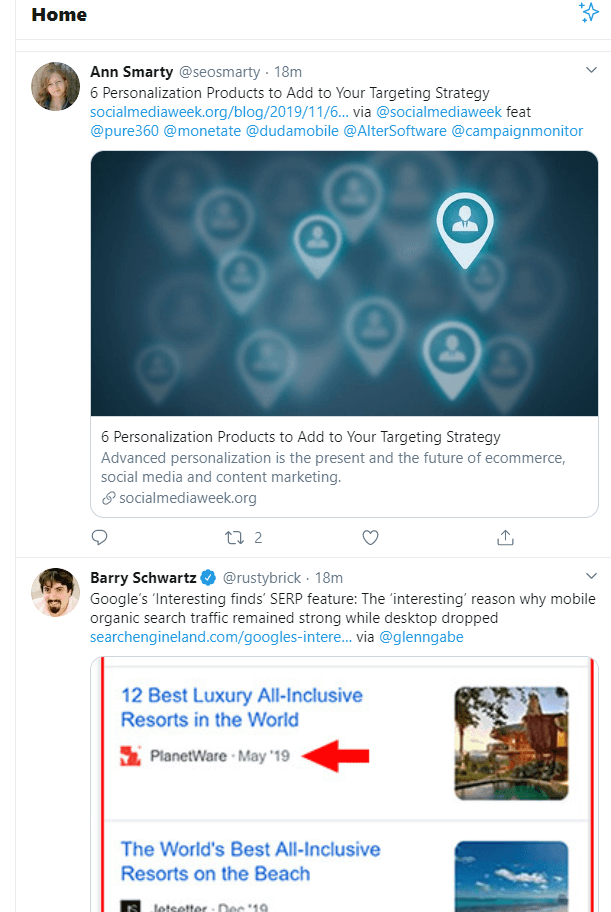
Once you manage to build expertise, you'll be able to position yourself as a thought leader in your industry and boost your career.
7. Make the Audience a Part of Your Journey
Your audience is one of your most powerful assets when building a personal brand. Engage with them directly by soliciting feedback, answering questions, and responding to comments. Not only does this create a sense of community, but it also helps build loyalty and credibility.
Create content that involves your audience, whether through polls, surveys, or interactive Q&A sessions. Share personal brand statement examples that resonate with your audience’s needs and show how your skills can help solve their problems. The more involved they feel in your journey, the more loyal they will become.
By allowing your audience to take part in your story, you build trust, foster engagement, and lay the foundation for future growth.
In the end, there’s one thing we all have to remember: being a personal brand for the sake of being a personal brand is the quickest way to not being a personal brand at all.
You need to do things with purpose to build an effective personal brand online. Don’t waste time on something that doesn’t align with your personality and professional goals.
If you’re true to yourself and want to build a personal brand, make sure you create a brand strategy and a marketing plan for that, and stick to it. This could include optimizing your LinkedIn profile, staying active on social media, and regularly engaging with your targeted audience.
If you're true to yourself and want to build a personal brand, then make sure you create a marketing plan for that and stick to it.
Building a strong personal branding strategy requires commitment, but the rewards are worth it. Whether you’re aiming to improve your visibility, advance your career, or simply create a digital presence that accurately reflects who you are, developing your personal brand is essential. By staying authentic, sharing your experiences, and continually engaging with your audience, you’ll carve out a place for yourself in the digital world.
Remember to start posting regularly, maintain consistency, and leverage both your professional and personal personality to create a brand that resonates with your audience. For further guidance, check out related articles and table of contents that offer deeper insights into building your personal brand effectively.

